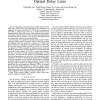Free Online Productivity Tools
i2Speak
i2Symbol
i2OCR
iTex2Img
iWeb2Print
iWeb2Shot
i2Type
iPdf2Split
iPdf2Merge
i2Bopomofo
i2Arabic
i2Style
i2Image
i2PDF
iLatex2Rtf
Sci2ools
INFOCOM
2008
IEEE
2008
IEEE
Queueing Analysis of Loss Systems with Variable Optical Delay Lines
—Recently, a new optical device called variable optical delay line (VODL) has been proposed in the literature. As suggested by its name, the delay of a VODL can be dynamically set within a certain range. Once set, a VODL behaves like a traditional fiber delay line and can admit packets requiring the same delay as that set by the VODL. As in the queueing context, a VODL can thus be viewed as a server that serves packets with the service times equal to the required delays. In this paper, we consider loss systems with parallel VODLs subject to various classes of packet arrivals. Such loss systems are different from the classical loss systems as a VODL, even when occupied, can still admit new packets with the same delay. For the case with an infinite number of VODLs, we show that the number of VODLs occupied by different classes of packets still has a product form solution. However, the analysis for the case with a finite number of VODLs is much more difficult. For this, we propose a...
| Added | 31 May 2010 |
| Updated | 31 May 2010 |
| Type | Conference |
| Year | 2008 |
| Where | INFOCOM |
| Authors | Duan-Shin Lee, Cheng-Shang Chang, Jay Cheng, Horng-Sheng Yan |
Comments (0)

